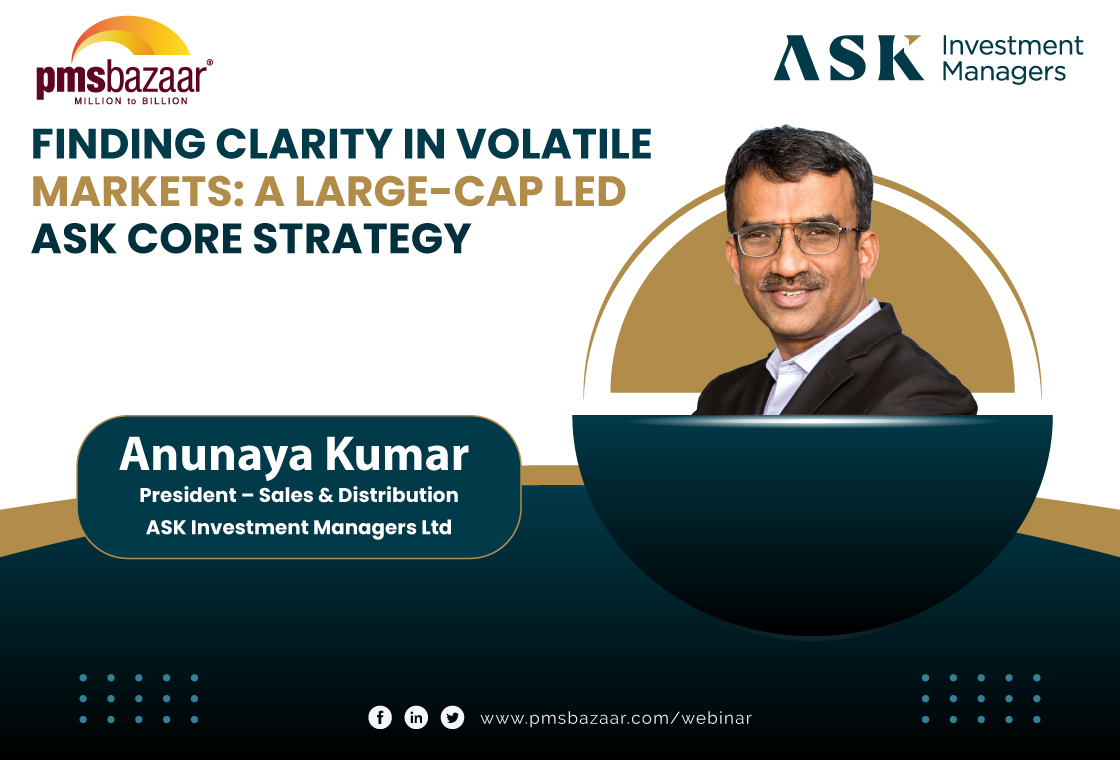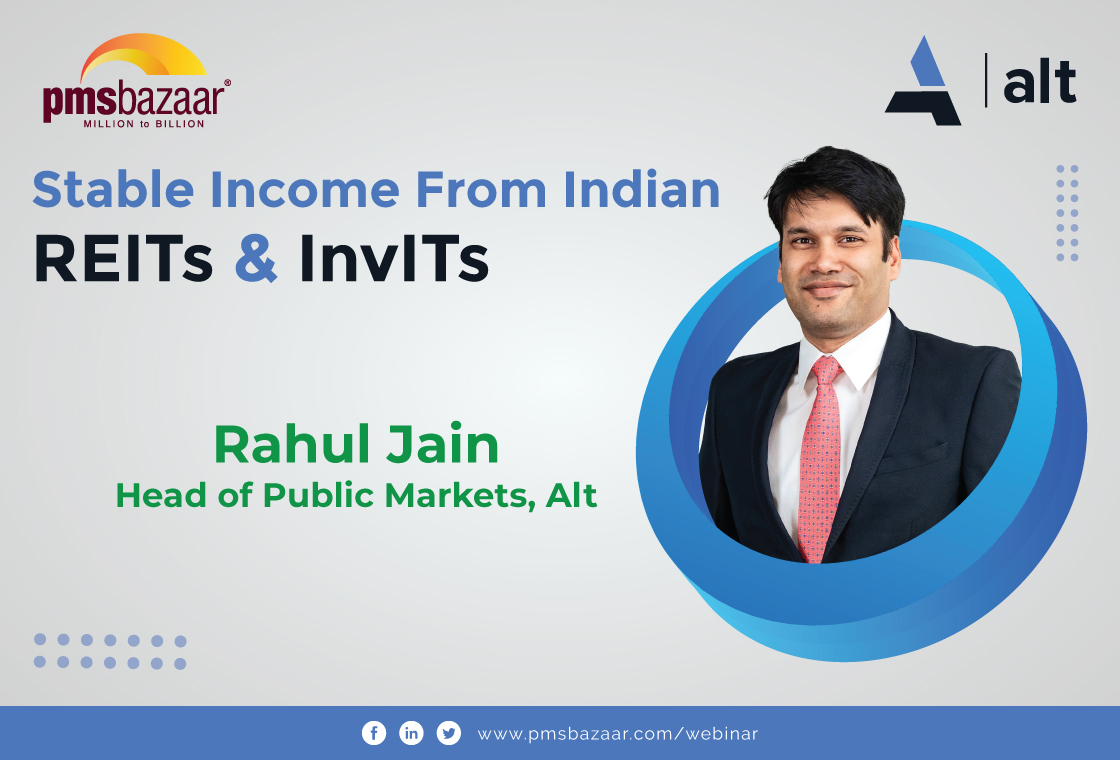India's strong economic growth, stable regulations, and large domestic market make it an attractive investment destination with diverse options. Among them, Alternative investments in India are especially compelling. Data shows that the Indian alternative investment industry (PMS & AIFs) has witnessed a compound annual growth rate (CAGR) of 27% over the past five years (FY19 to FY24).

Despite global uncertainties, India
shines as a beacon of investment potential across asset classes. Several
factors contribute to this: healthy government incentives, a vibrant domestic
market, stable regulations, favourable demographics, a rise in income levels
and a strong focus on infrastructure development. Together, these elements fuel
one of the highest GDP growth rates (6.7-7%) among developing nations.
The stability of the Indian economy
opens doors to diverse investment opportunities, from equities and bonds to
REITs, PMS, AIFs, commodities, and more. Recognising this potential, several
multilateral institutions and global banks including IMF, and S & P Global
Ratings have recently revised their growth projections for India upwards. The
latest revision of India’s growth estimates comes from India Ratings and
Research. The agency has revised the country’s GDP growth estimate for FY24 to
6.7% from 6.2% earlier. The revision comes on the heels of the Reserve Bank of
India upping its GDP growth forecast for 2023-24 by 50 basis points to 7%, from
6.5% earlier.
Given this promising outlook,
considering alternative investments in India becomes especially compelling.
Data shows that the Indian alternative investment industry (PMS & AIFs) has
witnessed a compound annual growth rate (CAGR) of 27% over the past five years
(FY19 to FY24).
With India’s ambitious target of
becoming a $10 trillion economy by 2035, alternative investments offer exciting
opportunities for growth and wealth creation.
Alternative investments: A
compelling choice
The Indian alternative investment
industry is booming, driven by strong economic growth and a growing appetite
for sophisticated investment options among HNIs and UHNIs.
Over the past five years,
Alternative Investment Funds (AIFs) have grown an impressive 34% CAGR, with
their assets under management (AUM) reaching a staggering Rs 9.54 lakh crore as
of Sep 2023. This stellar growth is primarily fuelled by the rising popularity
of Category II AIFs, which include private equity, real estate funds, venture
capital, venture debt, infrastructure funds and more. HNIs and UHNIs, with
their rising wealth, have fuelled this trend, propelling Category II AIF
commitments a staggering sixfold from Rs 1.45 lakh crore in 2018 to Rs 7.82
lakh crore in 2023, despite a minimum investment requirement of Rs 1 crore.
Meanwhile, the Portfolio Management
Service (PMS) industry exhibits a steady growth trajectory. AUM managed by PMS
providers has jumped at a 19% CAGR over the past five years, reaching Rs 6.19
lakh crore (as of December 2023).
This sustained growth speaks volumes
about investors’ interest in PMS despite the regulatory change mandating a
higher minimum investment requirement amount of Rs 50 lakh versus Rs 25 lakh
earlier.
In terms of returns, within the PMS Bazaar universe, PMS approaches have delivered a remarkable performance. About 86% of the PMS approaches outperformed benchmark returns in the past year, based on December 31 data, which is essentially every 9 in 10 PMS approaches. Similarly, in the long run (10 years), 77% of the PMS approaches have outperformed benchmark returns.
|
|
PMS |
AIF |
||
|
|
Dec 2018 |
Dec 2023 |
Sep 2018 |
Sep 2023 |
|
AUM Rs (lakh crore) |
2.61 |
6.19 |
2.17 |
9.54 |
|
5-year CAGR (%) |
19 |
34 |
||
Source: SEBI
Why a positive outlook?
Looking ahead, both PMS and AIFs are
poised for continued rapid expansion. This optimism stems from India’s strong
macroeconomic tailwinds and rising prosperity, factors that have been
instrumental in their past success. The projected doubling of India’s HNI
population by 2027, as per Knight Frank, further bolsters this outlook.
Recent regulatory changes are also
playing a part in this narrative. Modifications in tax rules for debt mutual
funds and insurance policies are likely to drive HNIs away from these options
and towards the tax-efficient world of alternative investments.
Ultimately, it’s the heightened
awareness among HNIs of the diversification and wealth creation potential
offered by alternative investments that will solidify their long-term growth.
As information about these alternatives becomes more readily available, along
with the rising income levels and unique investment needs of HNIs and UHNIs,
the demand for bespoke and structured PMS and AIF products is set to rise,
pushing the industry to new heights.
What works in favour of India?
India’s economic growth narrative is
optimistic with a GDP growth rate of 6.3% (average) annually, strong
demographics, financial deepening, fiscal prudence, and healthy reforms
underpinning India’s upward trajectory.
Demographic factor – A positive
At the core lies India’s demographic
dividend. With a median age below 30, the nation boasts one of the world’s
youngest and largest workforces. This translates to a readily available pool of
skilled and cost-effective labour, a driver of robust domestic consumption and
attracts foreign investments as well. Further, the sheer size of this young
population leads to innovations in the economy, thereby ensuring continuous
adaptability and resilience.
Financial deepening
Complementing this demographic
benefit is a flourishing financial system. Credit penetration is steadily
increasing, thereby unlocking previously dormant markets and encouraging the
growth of small and medium-sized enterprises. This enhanced financial inclusion
facilitates investment, fuels consumption, and adds capital into key sectors,
leading to overall economic expansion.
Fiscal responsibility
Notably, India’s economic rise is
not fuelled by reckless debt accumulation. Total corporate debt sits at a
healthy 51-52% of GDP and according to a Nippon India Mutual Fund report
India’s debt has remained constant since the global financial crisis of 2008 at
nearly half of the global
level. The household debt, on the
other hand, remains even lower at 20%, says the report. Thus, favourable
demographics and low debt are key ingredients for a prolonged period of a
virtuous cycle of consumption, incomes, savings and investments.
Healthy reforms and regulations
Beyond leveraging its strengths,
India has actively fostered growth through economic reforms over the past 5-8
years. Streamlining bureaucracy, improving the ease of doing business, and
implementing the Goods and Services Tax (GST) have all contributed to a more
transparent and efficient economic environment. This momentum is further
strengthened by a leap in the Ease of Doing Business ranking (World Bank), from
142nd in 2014 to 63rd in 2022. Initiatives like RERA (Real Estate Regulation
Act) safeguard investors and curb project delays, PLI (Production Linked
Incentive Scheme) boosts domestic manufacturing and job creation, and UPI
(Unified Payment Interface) which enables real-time money transfers,
particularly for MSMEs reducing the working capital burden, are fuelling this
transformative journey.
In conclusion, India’s economic rise isn’t a flash in the pan but multiple internal and external factors such as receding inflationary pressures and stable crude oil prices, working in perfect sync for India, towards sustained economic growth and global leadership. While challenges remain, India’s economic engine should be able to overcome them and continue to roar on the global stage. In this context, the Indian alternative industry offers immense potential for growth to investors.
Recent Blogs

MICRO CAPS: The Dark Horses of the Indian Equity Market
PMS Bazaar recently organized a webinar titled “MICRO CAPS: The Dark Horses of the Indian Equity Market,” which featured Mr. Rishi Agarwal and Mr. Adheesh Kabra, both Co-Founders and Fund Managers, Aarth AIF. This blog covers the important points shared in this insightful webinar.

Finding Clarity in Volatile Markets: A Large-Cap Led ASK CORE Strategy
PMS Bazaar recently organized a webinar titled “Finding Clarity in Volatile Markets: A Large-Cap Led ASK CORE Strategy,” which featured Mr.Anunaya Kumar, President – Sales and Distribution ASK Investment Managers Limited. This blog covers the important points shared in this insightful webinar.
.jpg)
Passively Active Investing — A Modern Investor’s Lens on ETF-Based PMS
PMS Bazaar recently organized a webinar titled “Passively Active Investing — A Modern Investor’s Lens on ETF-Based PMS,” which featured Mr. Karan Bhatia, Co-Founder and Co-Fund Manager , Pricebridge Honeycomb ETF PMs. This blog covers the important points shared in this insightful webinar.

Spot the Trouble: Red Flags in Equity Investment Analysis
PMS Bazaar recently organized a webinar titled “Spot the Trouble: Red Flags in Equity Investment Analysis,” which featured Mr. Arpit Shah, Co-Founder & Director, Care Portfolio Managers. This blog covers the important points shared in this insightful webinar.

Long-Only AIFs Rebound Sharply in October; Long-Short Strategies Lag Despite Lower Volatility
106 long-only AIFs averaged 3.68% vs 32 long-short AIFs at 2.7%; only 24–31% of funds beat key indices

Markets log strongest monthly gains in 7 months; PMS performance turns near-uniform in October
Nifty 50 TRI gained 4.62%, BSE 500 TRI rose 4.27%; 415 of 427 equity PMSes ended positive

How SMEs are Shaping India’s Investment Landscape?
PMS Bazaar recently organized a webinar titled “How SMEs are Shaping India’s Investment Landscape?” which featured Mr. Shrikant Goyal, Fund Manager, GetFive Opportunity Fund.

Stable Income from Indian REITs and InvITs
PMS Bazaar recently organized a webinar titled “Stable Income from Indian REITs and InvITs,” which featured Mr. Rahul Jain, Head of Public Markets, Alt.

